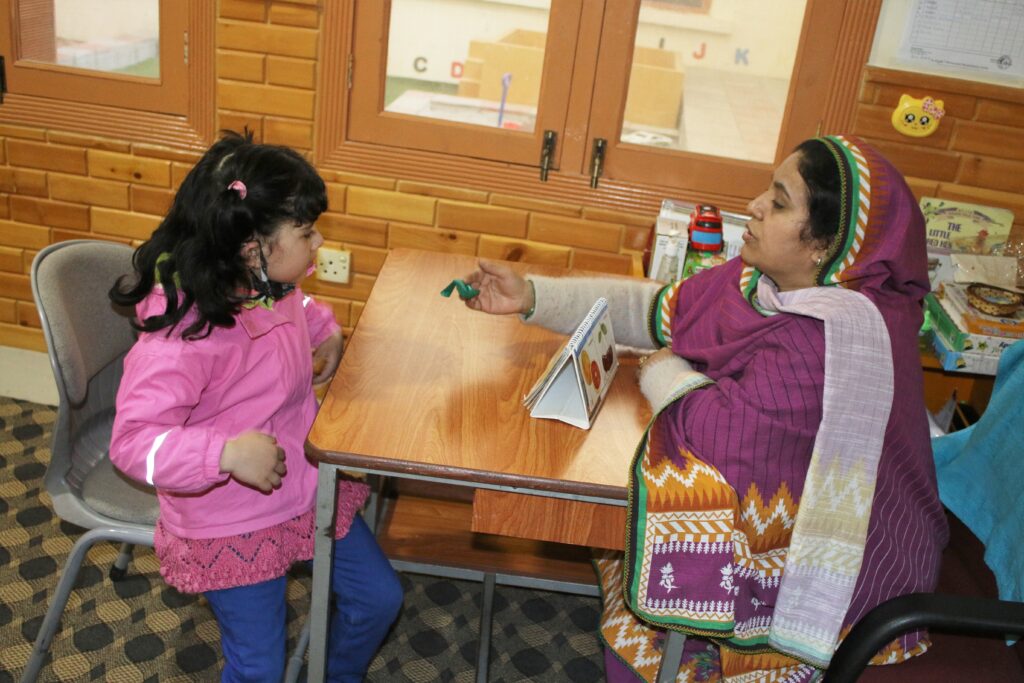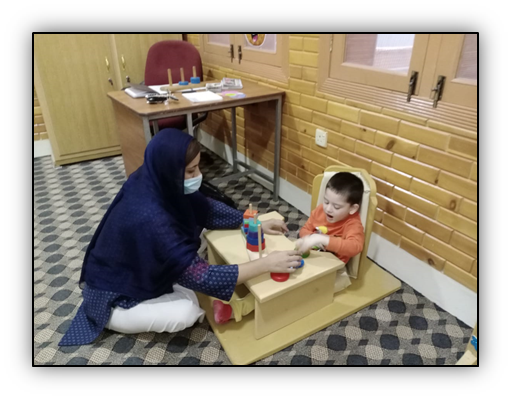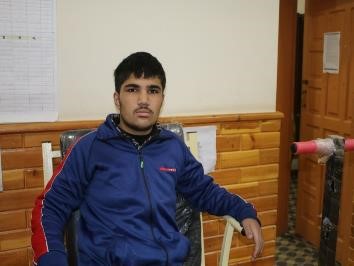Rehabilitation
DR AZIZALI F MOHAMMED REHABILITATION CENTRE
This is a well-equipped state-of-the-art facility in Gilgit Baltistan comprised of specialized units which provided systematized quality rehabilitation services since 2017. At the moment a qualified/experienced multi-disciplinary team is equipped to facilitate the public. However, the center offered physiotherapy, speech therapy, occupational therapy, and behavior therapy. Similarly, a socialization class concept is also an important part of the facility, which accommodated children with special needs for learning lifelong skills.
Units at the center
Physiotherapy Unit:
A well-equipped unit that is functional with the remediation of impairment and disabilities to restore, and maintain mobility, function, and well-being where trained staff is providing service throughout the year on regular bases. An experienced team is there to address functional limitations & reduced disability impacts by enhancing greater mobility.

Speech-therapy Unit:
A resourceful Speech therapy unit has catered to overcome communication problems and speech disorders and improving communication skills. This facility is catered to treat a variety of communication impairments and to get advice in a calm environment without any disruption.

Occupational-therapy Unit:
This well-equipped unit is functioning to help people who have physical, sensory, or cognitive problems. The Ultimate aim of this unit is to provide support for regaining independence in all areas of their lives and to enable people to participate in the activities of everyday life. Under this intervention, 39 (18 boys & 09 girls) cases are registered and the team engaged these cases as per as defined time schedule on a regular or interval basis throughout the year.

Behavior therapy Unit: In this unit, a psychologist successfully catered to 18 (16 boys & 02 girls) to address self-destructive or unhealthy behaviors by using various motivational techniques. The aim is to replace undesirable actions and behaviors with more desirable ones, thus leading to better results and outcomes in life, and to swap objectionable, problematic, or disagreeable behaviors with more positive, desirable behaviors.

Parent Counseling:
The intervention was structured to enhance effective parent involvement in the Rehabilitation process, which provided moral support and guidance to resolve their problems and understand vital roles. It’s also their help to ensure the socialization of targeted individuals in the family to understand individual learning capabilities. In this regard, the team arranged various effective sessions with 92 families, (49 male and 43 female).

SOCIALIZATION CLASS CONCEPT SERVICES
Socialization is a highly complex lifelong process that required ongoing procedures, which Interacting with friends, being told to obey rules, values, norms, and how to behave, and being rewarded for doing tasks that enable a person to function within the cultural values and norms of a given society. This concept was established in light of four general principles: providing special attention, care, and support, removing barriers, eliminating discriminatory approaches, and learning opportunities according to their capabilities. The ultimate purpose was to acquire knowledge and skills to become a useful member of society. The ultimate purpose was to offer specific attention-oriented services to the parents to deal with the cases at home. It is the part of Rehabilitation services where trained staff is working on individual behavior modification, confidence building, music, recreational, and life learning skills. Secondly, provides support, and guidance to the parents regarding how to deal with the cases at home. Under this intervention total of 38 (27 Boys & 11 Girls) are registered.
Socialization Level 1:
Socialization level 1 started in 2019, aim was to provide a platform that could help children get socialized and address inappropriate behavior. In this classroom environment, children are engaged in activities of daily living skills such as wash hands, attaining lunch, sharing their things, and other manners. Similarly, group activities and sports are also part of the program. Under this concept 16 (11 Boys & 05 Girls) are registered.

Socialization level 2
Initiated in 2021. There were two reasons behind this initiative, the high demand for enrollment, and secondly, providing more focused attention to children with mild to moderate symptoms who could enroll in inclusive schools in the future. This concept accommodated 22 (16 Boys & 06 Girls) to get learning opportunities. The core aim is to help children to learn daily living skills, improve socialization and enhance basic knowledge in the context of academics. Proudly, 05 children with low cognition successfully acquired admission in academics after getting improvement


Success Story of Asad
When he was 2 years old, parents noticed inappropriate behaviors in their child. Hence, the parents consulted with a doctor to get advice, after evaluation he was diagnosed with autism spectrum disorder (ASD). At the age of 3.6, the child registered in MFF Rehabilitation Center on September 23, 2020, with the same features. During the first consultation, the child was referred for screening and one week of observation in different settings. During the screening process weakness was found, such as the child exhibiting temper tantrums, difficulty paying attention and concentrating, communication problems, stereotypical behavior, avoiding eye contact, trouble following commands, and did not respond to his name. He preferred to stay isolated and had difficulty maintaining conversation and responding to his surroundings
Keeping view of the above-identified findings, the child referred to engage in Behavior Therapy sessions. After one month of regular therapy sessions, he was showing considerable change in his behavior.
Similarly, his socialization problems were resolved to accommodate in socialization class concept where the aim was to boost socialization skills and make him able to adjust himself to an external environment.
During one and a half years, he was also engaged in speech and occupational therapy sessions. It was a difficult task but after the valiant efforts, he improved his social and other skills and finally successfully mainstreamed in MF inclusive school.
Now, he is an inclusive student in reception Montessori and his teachers were very much satisfied with his progress. Furthermore, he has shown a remarkable change in communication skills as he can speak complete sentences and he has made his social circle with friends and also participated in classroom activities as well.
Success Story of Asadullah

Asadullah was identified during a doorstep visit under the CICD project intervention in 2014. While in the initial assessment and observation, he was found developmentally delayed and was having multiple issues such as physical, speech, and cognition impairments at the time of evaluation and the child could only make some humming sounds.
His parent also confirmed that the child couldn’t react as other peers could. However, the CICD team provided home-based therapies which included posture training, physiotherapy, occupational therapy, speech therapy, and education through play sessions regularly. Meanwhile, his mother was also trained in basic rehabilitation techniques. Later on, the child was provided equal educational opportunities in the same classroom in 2017 but he couldn’t progress academically throughout the two years of hard work. Keeping view of his performance, the CICD team suggested accommodating him to the socialization class concept, where the team could continue rehabilitation activities and pay precise focus on the activity of daily living skills enhancement. The ultimate aim was to enhance independent living skills.
After approximately 8 years long period, his parent’s determination and team efforts eventually improved the child in all aspects, particularly in terms of physical and social aspects. Moreover, he is able to walk without support, communicate feelings in complete sentences, and be well aware of social manners. The MFF team is highly motivated regarding the child’s progress. Therefore, he is still engaged in rehabilitation interventions as his parents are willing to continue and highly appreciate the progress. Parents also pay tribute to the contributors and endeavors of the CICD team and pray for the future progress of this program.
Copyright @2022. Mehnaz Fatima Foundation | Maintained by Metatech
